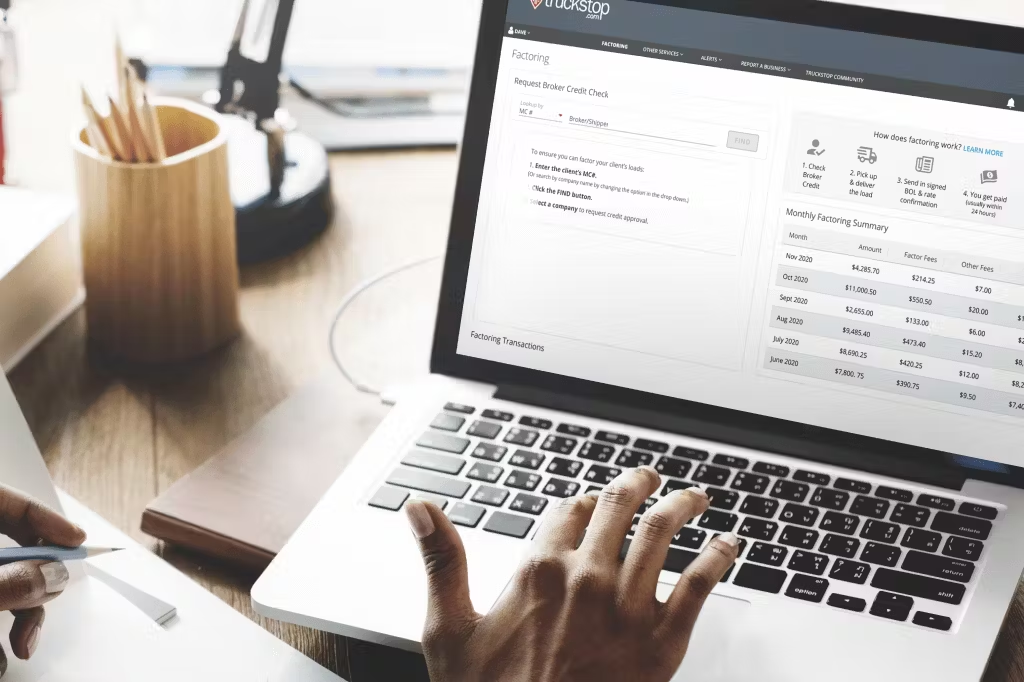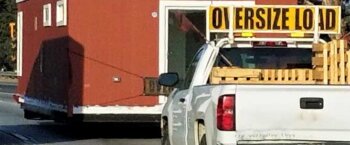Recourse vs. Non-Recourse Factoring

Get paid faster with Factoring.
Say goodbye to cash flow worries.
Managing cash flow is one of the biggest challenges for trucking companies. Waiting weeks—or even months—to get paid puts pressure on fuel, payroll, maintenance, and day-to-day operations. Factoring helps solve that problem by paying you upfront for the work you’ve already completed.
Invoice factoring is the practice of “selling” your invoices, or accounts receivables, to a company that then pays you right away for that invoice, minus a fee. You get steady cash flow, less back-office work, and more confidence in your ability to run and grow your trucking business. Many factoring companies also handle collections on your behalf so you’re not chasing payments.
There are two main types of factoring: recourse and non-recourse freight factoring. The biggest difference is what happens if your broker or shipper doesn’t pay. Here’s what you need to know to choose the right option for your operation.
Recourse factoring
Recourse factoring is the most common and typically the most affordable option. You sell the invoice, but if your customer never pays, you are responsible for buying the invoice back.
The factoring company should make every reasonable attempt to collect for you. But if your broker or shipper refuses to pay on time, you have to buy that invoice back from the company and take over collection efforts yourself. You’ll pay a lower fee in exchange for assuming this risk yourself.
Advantages of recourse factoring
Here are a few reasons why you might want to consider recourse factoring:
- Lower fees. Recourse factoring typically offers the lowest rates.
- Easier qualifications. Because you carry more risk, approval is usually simpler.
- Less administrative work. You still avoid most collections unless the broker or shipper doesn’t pay.
The disadvantages of recourse factoring
Entering into a recourse factoring agreement does come with more risk:
- You must buy back unpaid invoices. This can strain cash flow if you’re not prepared.
- Financial disruption. Large buybacks can affect your ability to cover expenses.
Which businesses should use recourse factoring?
Recourse factoring works best for trucking companies that have solid relationships with reliable brokers and feel confident in their customers’ payment habits. If your cash flow is steady and you’re comfortable taking on a little risk in exchange for lower fees, recourse can be a smart, cost-effective choice.
Non-recourse factoring
With non-recourse factoring, the factoring company assumes the risk of non-payment for specific covered reasons. The factoring contract outlines what is covered, but most commonly if the broker or shipper becomes insolvent or goes out of business.
You still need to submit clean, dispute-free invoices, but the financial risk for approved events shifts to the factoring provider.
The advantages of non-recourse factoring
Non-recourse factoring has three advantages:
- Protection against covered non-payment. If a broker shuts down or becomes insolvent, you’re not responsible for the invoice.
- Reduced administrative burden. The factoring company handles collections for covered debts.
- More predictability. You get added peace of mind when working with newer or higher-risk customers.
Disadvantages of non-recourse factoring
You’ll also want to consider the drawbacks of non-recourse factoring:
- Higher cost. Rates are slightly higher because the factoring provider takes on more risk.
- Coverage limitations. Only certain credit-related events are protected.
- May not be available for all brokers. Providers set stricter approval criteria since they take on more of the risk.
The primary disadvantage of non-recourse factoring is the cost. Generally, non-recourse factoring is more expensive than recourse factoring. The higher price serves to protect the factoring company from potential bad debt.
It is also essential to understand that the level of protection varies by company. The more protection, the higher the cost. If the debt is uncollectible for a reason not covered by the factoring agreement, you will need to buy it back.
What isn’t covered by a non-recourse factoring agreement?
Every factoring company is different. Some only cover the debt when the broker or shipper goes bankrupt or out of business. Others offer broader protection. But in general, these situations are rarely, if ever, covered:
- Invoices that you send directly instead of through the factoring company
- Invoice disputes
- Breach of contract
- Situations in which you contribute to the credit problem
Read the fine print carefully before signing any agreement.

Which businesses should use non-recourse factoring?
Non-recourse factoring is a good choice for carriers who want extra protection and fewer surprises. It’s especially helpful for newer trucking companies or anyone hauling for a mix of established and higher-risk brokers, where payment uncertainty is more common.
Fleets that want to avoid buyback risks often gravitate toward non-recourse, and many owner-operators prefer it because it brings more stability and takes some of the administrative weight off their shoulders.
Remember to look carefully at each provider’s terms and options to find the right factoring choice for you.
What Today’s Trucking Companies Should Consider Before Choosing a Factoring Model
The truckload sector remains in the midst of a multi-year freight slump, with weak demand, overcapacity, and rising carrier failures. During this time of tight margins and uncertain volumes, maintaining steady cash flow and working with a reliable partner are more important than ever.
When freight is down, every decision about who you haul for and how you protect against non-payment matters. Here are some considerations for 2026.
1. Broker stability and credit tools matter more than ever
In recent years, the brokerage sector has seen rising risk of failure. Freightwaves predicts a wave of brokerage closures in 2026 if conditions persist. That makes your choice of brokers and the tools you use to vet them critical.
Running credit checks, having access to broker payment histories, trends and risk alerts through your factoring partner are tools that help you protect your business from non-payment when the market is soft.
2. Cash flow supports both daily operations and long-term growth
When volume is down and rates are weak, steady cash flow isn’t just “nice to have”, it’s essential. It helps you cover fuel, payroll, repairs and other immediate costs, while also letting you invest in growth.
3. Factoring should reduce your back-office work—not add to it
A strong factoring program should help with billing, collections, document tracking, status updates, and faster processing.
With fewer administrative tasks on your plate, you can focus more on driving, dispatching, and growing your business.
Recourse vs. non-recourse factoring: Which is better?
In general, this is a question you will have to answer based on your trucking company and your circumstances. Each method has different costs, advantages, and disadvantages. Here are some questions to ask yourself before you decide:
- How creditworthy is this broker/shipper?
- Can I absorb the costs of factoring and still be profitable long-term? (If not, you may want to look at the rates you charge.)
- What kind of risk can my company handle?
- Does my factoring company handle slow payments? How soon will I have to buy back unpaid invoices?
- What circumstances does non-recourse factoring cover, and how likely are those to occur?
- Should I factor all of my invoices by recourse or non-recourse factoring, or should I take a hybrid approach?
Time and money are usually the major things to consider. Can you do something better with your time than billing and chasing down payments? Is it worth any fees you pay not to have to do those things? The type of factoring you choose may also change over time as you acquire new and reliable business relationships.
Find the right factoring company for your business.
Finding the right factoring partner means choosing a company that supports the way you operate and helps you stay steady in any market. With Denim by Truckstop, you get a factoring program built for carriers, owner-operators, and trucking companies of all sizes.
Here’s what you can expect:
- Instant payment options when you need cash in minutes.
- Credit checks on every broker so you know who you’re hauling for.
- Automated invoicing and collections to reduce back-office work.
- Selective factoring, letting you choose which loads you want to factor.
- Transparent rates and fees, flexible cancellation, and no minimum volumes.
You get paid on your invoices when you need it most and spend less time managing paperwork and chasing payments.
Want to see what your rate would look like? Calculate your rate today.
Topics:
Get helpful content delivered to your inbox.
Sign up today.
Find high-quality loads fast, get higher rates on every haul, and access tools that make your job easier at every turn.






